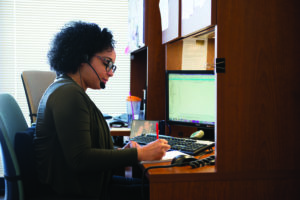
“It’s been very, very difficult at times,” shares Evelyn Cabrera, a senior community resource specialist and team leader for United Way 211 in Rhode Island. “But I couldn’t be more proud of our work and the ways we’ve been there to help our fellow Rhode Islanders throughout this crisis.”
When the COVID-19 pandemic forced resource specialists to work remotely from their homes, the service that our state and its residents can turn to for help 24/7, 365 didn’t miss a beat.
“We are the place where Rhode Islanders can get their trusted information,” says Courtney Smith, the director of 211, “and we’re going through the same pandemic with you.”
Looking back at the last non-pandemic year, 211 specialists ⏤ who handled 170,860 calls that year ⏤ took an average of 470 calls daily. Those calls typically lasted just over 3 minutes each.
In 2020, calls rocketed to 700 each day (peaking at 890), totaling some 255,164 for the year. And they lasted much, much longer… averaging 16 minutes. The increase in volume led United Way to expand 211 staff, bringing in specially-trained, temporary specialists thanks in large part to Rhode Islanders’ generous support of our Community Impact Fund.
And while the numbers were rising, resource specialists were navigating through call to call, and as caregivers and parents themselves.
For Evelyn, and her husband, that meant being there for their oldest daughter as she acclimated to distance learning and transitioning to high school rolled into one. Or caring for the needs of their youngest girl, now 4, who, like countless other local toddlers, suddenly found themselves unable to be in the early childhood environments we know are so important.
One minute, a 211 specialist could go from helping their child with a virtual school assignment to picking up the phone and talking to someone considering suicide, and getting them the help they need. Or being there to hear how a family is about to lose their home and connecting them with the support they need to stay housed. And comfort a caller lacking food after enrolling them in an emergency benefits program and providing a referral to a nearby pantry.
Then, multiply these calls by the tens of thousands, weaving in the need for specialists to learn and incorporate new pandemic-related programs on the fly.
There was the Quarantine and Isolation Resource Center (QIRC) in partnership with Rhode Island Department of Health (RIDOH), which supported individuals and families who were quarantined with food boxes and other necessities. With the Rhode Island Department of Human Services, we helped families with children participate in the Pandemic Electronic Benefit Transfer (EBT) program. And together with United Way’s Point, a program of the state’s Office of Healthy Aging, we offered Project Hello, placing calls to isolated, homebound seniors to check on them and get them essentials.
“As our world was turned upside down during this pandemic, our compassionate, skilled resource specialists stayed on the line helping hundreds of Rhode Islanders every single day,” says Cortney Nicolato, president and CEO. “And as we emerge from the pandemic, their steady presence is there for our neighbors who are on the line between crisis and wellness.”
“Sometimes you just need to let people vent; they’re upset ⏤ I know I’d be upset, too,” adds Evelyn. “When you’re in crisis, it can create desperation. But no matter what, we are here to help and that’s what we do. This is more than a job – this is making a difference. We’re all in this together and need to be there for one another.”
At United Way, we take great pride in the fact that 211 is always there for our Rhode Island neighbors. And while we’re moving closer toward the light at the end of the pandemic tunnel, there’s little question that 211 will be needed more than ever as tens of thousands recover from the aftermath of a global crisis.
But as they’ve done more than 1.5 million times since 2007, 211 community resource specialists will be there ⏤ on the line ⏤ ready to help.
